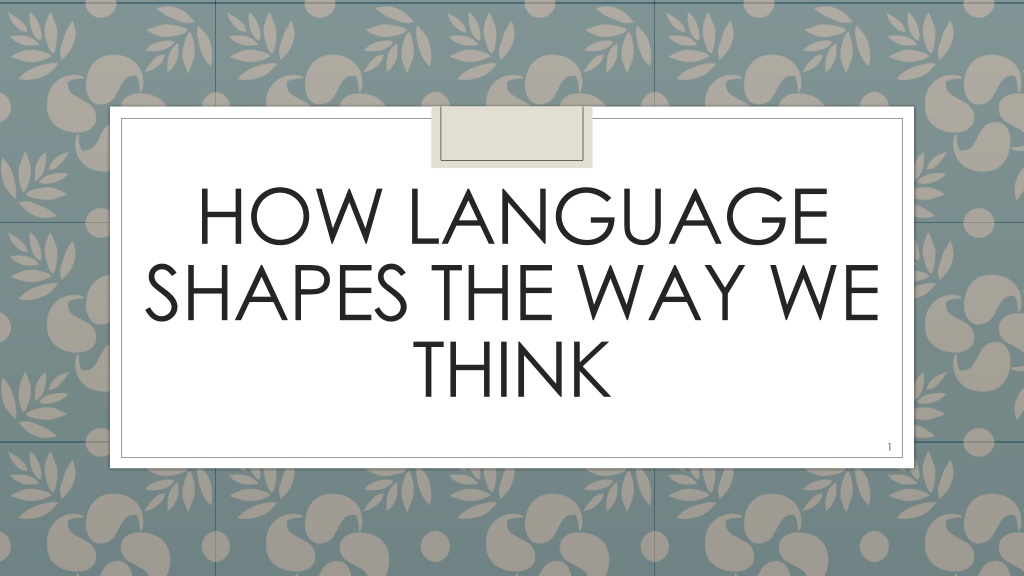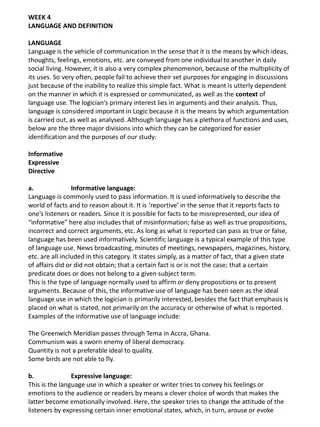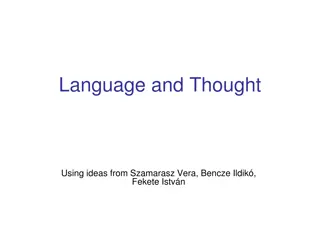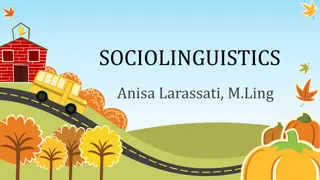Exploring How Language Influences Thought: Insights from TED Talk
Language plays a significant role in shaping our thoughts and perceptions, as discussed by Lera Boroditzky in her TED Women 2017 talk. She highlights how linguistic differences in languages like German and Spanish can impact cognitive processes and cultural perspectives. Boroditzky's insights shed light on the profound connection between language and cognition.
Download Presentation

Please find below an Image/Link to download the presentation.
The content on the website is provided AS IS for your information and personal use only. It may not be sold, licensed, or shared on other websites without obtaining consent from the author. Download presentation by click this link. If you encounter any issues during the download, it is possible that the publisher has removed the file from their server.
E N D
Presentation Transcript
HOW LANGUAGE SHAPES THE WAY WE THINK 1
Initial Thoughts Before we watch the video what are your initial thoughts? Do you think language shapes the way we think? How? 2
Deutsch & Espa ol Auf Deutsch/In German: Die Sonne/the sun =feminine Der Mond/the moon =masculine En Espa ol/In Spanish El sol/the sun =masculine La luna/the sun +feminine How can this shape the way non native English speakers think? 4
La llave Der Schlssel The key Does someone in this room speak a second language to compare definite articles? 5
Mark Twain and the German Language Marc Twain wrote an essay The Awful German Language about 140 years ago. Critique of the German language Der Mann, Die Frau, das M dchen, Das Fr ulein Der = masculine Die = feminine Das = neuter Do you think multilingual people have different personalities in different languages? 6
Der Apfel (m) La manzana (f) In a 2002 study by Boroditsky, Schmidt and Phillips, a group of Spanish and German speakers was asked to produce proper names for 24 different objects (for example, an apple could be named Patrick). Interestingly, participants were better able to memorize the object-name pairs when the gender of the proper name matched the grammatical gender of the object in their native languages. German speakers, for example, had a much easier time memorizing the pair Apple-Patrick than Apple- Patricia (apple, or der Apfel, is masculine in German). The opposite was true, however, for native Spanish speakers (the Spanish word for apple, la manzana, is feminine). Furthermore, as the participants of the study were tested in English a language whose nouns have no gender the experiment reveals a particularly unconscious way of thinking: The native German and Spanish speakers had so internalized the grammatical gender of their native language, that they automatically transferred it to other languages. Please read and discuss 7
Foreign Words that do not exist in English Fremdsch men (German); My t h pe (Finnish) Meaning something close to vicarious embarrassment , this is what you feel when someone makes a complete fool of themselves in front of a large crowd. This is that kid farting loudly at the school party, that girl slipping and falling at her graduation, that best man who freezes while giving the toast at the wedding. Vybafnout (Czech) If you have older siblings, you ve undoubtedly experienced vybafnout. It means to jump out at someone and say, Boo! . Of course, when that happens, you can t be held responsible for your actions. Other examples on handouts 8
Words that have a different meaning in other languages Gift Mist In Scandinavia, the word gift has two meanings. The first one means getting married, which makes sense because it derives from Old English words for wedding gifts or dowries. The second meaning is a little less celebratory. Gift is the word for poison in German, as well as Danish, Norwegian, and Swedish. It probably derives from an archaic verb form meaning to give because what is poison for if not to give to someone? What a gift! Mist has such delicate and dewy connotations in English. The word signals all things gentle and ephemeral, but it has the opposite meaning in Germany, where it s the word for manure, dung, and general garbage. You can also curse with it. Mist! Easy to get away with around English speakers. Can you give me synonyms? 9
Chose your words wisely Kiss In English, kiss comes from Old English variants of kyss or kussen, which means to kiss or touch with lips. They still spell it with a y in Sweden. However, when its spelled with an i over there, kiss can translate to another common noun that has absolutely nothing to do with kissing: urine 10























